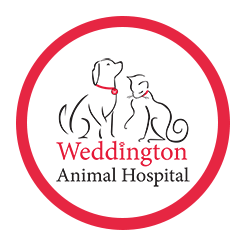You walk down the food aisle at the pet store. Bags of blue, pink, and purple surround you. Big lettered words like “natural,” “simple ingredients,” “grain free” are on the bags. The television commercials after dinner show images of wolves or lions running through picturesque nature scenes, eating fresh caught wild life. Diets can range from veterinary formulated for certain diseases to diets for certain lifestyles, ages, or breeds. All of this information is overwhelming. How do you know what is best for your pet?
With so many diet options out there, a few factors are important to consider. This blog will help you navigate the pet food industry and decide what is best for you and your pet’s lifestyle.
Not all diets are created equal.
With so many diets out there, it is important to consider the food quality. Dog and cat food which has been regulated falls under a standard called AAFCO (Association of American Feed Control Officials). To be AAFCO standard, the diet has undergone a laboratory feeding trial to ensure no health concerns have occurred from feeding the diet, and/or tests have been conducted to ensure the ingredients listed are in the amounts listed. Cost of diet does not always correlate with quality.
An AAFCO certified food will have a “guaranteed analysis” and a list of ingredients printed on the label, as well as the statement “(Name of product) is formulated to meet the nutritional levels established by the AAFCO (Dog/Cat) Food Nutrient Profiles.” or “Animal feeding tests using AAFCO procedures substantiate that (name of product) provides complete and balanced nutrition.” Without these claims or if claims from other organizations are listed, the ingredients or other products of the diet may not be valid or may be misleading.
Expensive diets or good marketing does not necessarily mean good quality.
Grain free diets have become a recent popular trend in the pet food industry. A common misconception with pet owners is that pet food allergies are caused by grain sensitivity. In dogs and cats, the most common food allergies seen are actually protein sources, such as chicken or beef. Grain allergies can occur, but are typically very rare.
Since 2018, the FDA started investigating a correlation with dog food and heart disease. They noticed that dogs fed exclusively grain free, exotic protein sources, or “boutique” diets are more prone to heart disease, specifically dilated cardiomyopathy. It is unknown at the time of writing this article what the specific cause is. Possible correlations between taurine deficiency and/or an increased amount of legumes (sweet potatoes, peas) in the diet have been speculated. These correlations are being further explored. At this time, it is recommended to feed an AAFCO certified diet which has been formulated by a veterinary nutritionist. The diet brands we recommend are veterinary formulated. This means that a veterinary nutritionist helped formulate these foods to ensure they are safe for your pet. These diets include Hill’s Science Diet, Purina ProPlan, or Royal Canin.
(For more information, check out https://www.fda.gov/animal-veterinary/animal-health-literacy/questions-answers-fda-center-veterinary-medicines-investigation-possible-connection-between-diet-and)
What about raw food?
Another popular trend in the pet food industry is raw or freeze dried pet food. This is typically not recommended by most veterinarians or by the FDA due to risk of contamination with food-borne bacteria or pathogens. The most common pathogens found in pet food are Salmonella and Listeria spp. Raw foods can pose a health risk when handling or preparing raw food for your pet. Just like raw egg or cookie dough if ingested, serious health effects such as vomiting, diarrhea or bacterial overgrowth. The best way to prevent exposure is to avoid feeding your pet raw food.
(For more information about raw food and safety – check out https://www.fda.gov/animal-veterinary/animal-health-literacy/get-facts-raw-pet-food-diets-can-be-dangerous-you-and-your-pet).
What about homecooked diets?
Homecooking your pet’s food is a popular option. Some people enjoy cooking for their pet as a family activity. However, just like humans, ensuring your pet’s diet is nutritionally formulated is of extreme importance to prevent health issues. If preparing a homecooked diet, it is best to consult your veterinarian or a boarded veterinary nutritionist to ensure the proper vitamins and minerals are balanced. Without proper nutrition, pets can be susceptible to a variety of health conditions such as heart disease, orthopedic disease, and others. Proper homecooked diets can be time consuming and expensive, but can be a good way to bond with your pet if healthily formulated by a veterinarian. It is important to discuss this option with your veterinarian prior to feeding homecooked to ensure the diet is properly formulated and balanced to prevent health issues.
Summary
Choosing the right diet for your pet can be challenging. It is important to be informed about common misconceptions in the pet food industry. If you have any questions about what food is right for your pet, the best place to seek information is directly from your veterinarian. Veterinarians are trained in nutrition in veterinary school and have access to the most up to date information regarding pet food. For any specific questions regarding your pet or their diet, please call us at 704-847-8466 or email us at wah@wahcares.com.

